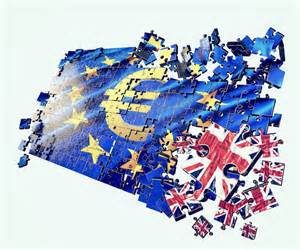British elites have been wondering for decades whether the UK still had clout on the global stage, and now they know: indeed, the country has an outsized influence on world affairs. But what a way to find out, sowing instability far and wide and suffering a never ending series of self-inflicted wounds. It is tragedy bordering on farce. And none other than Vladimir Putin is having the last laugh.
The UK is counting the costs of this fateful vote: in the plummeting value of the pound and large-scale stock market losses. Foreign direct investment in the UK will dramatically dwindle; multinational companies will move their headquarters; and a brain drain will ensue. British banks are likely to lose their “passport” to the rest of Europe. All of this will lead to less growth, higher unemployment, and reduced living standards. Prime Minister Cameron’s even worse sin was to subject Britons to several rounds of harsh austerity policies–they had to vote the UK out of the EU to get rid of him.
The major long term loss for Britain, however, will be its reduced influence as a world leader–its military capability being one of the chief casualties of unnecessary austerity. It has long punched above its weight globally speaking, remaining a fairly major world player long after Britain lost its empire, with the special relationship with the U.S., impressive military capabilities, financial leadership, and first-rate diplomatic skills. The UK was also an EU leader, one of the top three along with France and Germany. England could be left alone, with Scotland leading the way by leaving the UK and rejoining the EU.
All but one of these is soon to falter, starting with the special relationship. President Obama had to say that the UK is still a great ally of the U.S., primarily because he has to try to dent the damage Brexit is expected to have on the U.S. In reality, the UK is less useful to the U.S. Not only is the UK on its way out of the EU, but it’s diminished economic condition will also force it to pair back what it spends on its military and intelligence capabilities. The UK could compensate for Brexit by doubling what it contributes to NATO, but it will be unable to afford to do so.
Elite members of the “Leave” campaign charged that the U.S. would never remain subservient to a foreign court or a supranational government above its own. The U.S., it is true, in its current state would not go down such a road, for it is the world’s sole superpower. But, were it in Britain’s shoes at present it most certainly would—just as the UK wouldn’t if it were the world’s reigning colossus keeping the shipping lanes open in the East and South China Seas and so forth.
“Leave” campaigners also claimed that Britain on its own would be able to negotiate a favorable trade deal directly with the U.S., as well as maintain strong trade ties to Europe. But Americans are in a foul mood these days, with workers buffeted by the downsides of globalization and temporarily more nationalist and less tolerant than they normally are. And as far as the EU is concerned, it will be forced to play hardball with the UK in order to signal to other EU members that leaving is prohibitive.
What is more, France has begun to look more reliable to U.S. leaders, for not only has Paris continued to take on global leadership—from its Mali military operation to Middle East peace efforts—but a prominent Frenchman recently reminded Washingtonians that France was America’s “original ally.” The West collectively will appear less reliable, less stable, with the demise of the big U.S.-EU trade deal being the first casualty. The appearance of a diminished Western hemisphere will negatively affect what Asians, Middle Easterners, and Africans think of the U.S./UK/Europe. This will help Russia and China, possibly even Iran.
The U.S. is also already being harmed economically. To begin with, stock markets around the world have seen collapsing indexes and wealth wipeouts, and this includes Wall Street and the U.S. market. Already investors’ rush to hold the dollar will make U.S. exports less competitive, thereby negatively affecting GDP and American jobs.
With conventional deterrence in Europe eviscerated by Vladimir Putin’s annexation of part of sovereign Ukraine and propping up the barrel-bombing Assad regime in Syria, the U.S. needs the UK leading in the EU and keeping the sanctions regime fully in place against Russia. Inside the Beltway U.S. leaders tend to view Britain as a useful counterweight to Germany, for they’re aware of how many German firms do business in Russia and the degree to which the continent remains dependent on Russian gas.
The U.S. also needs its most reliable ally to help it deal with an increasingly aggressive China—in particular the annexation of islands from Philippines and Vietnam but also, the suppression of democracy in Hong Kong. The UK has also been playing a leading role taking on the remnants of al-Qaeda and taking the fight to ISIS in Iraq and Syria, not to mention the efforts of its troops and civilian experts in places like Afghanistan.
And now that the UK is packing up and politically retreating back across the Channel, the admiration Americans hold for Britain will also falter as the openness and tolerance of our British cousins will increasingly be called into question. The UK is rapidly becoming less recognizable, and a whole lot more bewildering. After all, it was Winston Churchill who first called for a united states of Europe back in 1946.
My first year out of college I went to work in the House of Commons for Sir Edward Heath, the oldest serving MP and the former Conservative Prime Minister who led almost a decade worth of UK-EEC negotiations ahead of the UK’s entry into what would become the EU as Prime Minister in 1973. I was his speechwriter and research assistant and ghost wrote the three chapters of Sir Edward’s memoirs that deal with these events.
When I worked for the man who led Britain into what became the EU—the most successful political experiment in world history—I soon came to respect Sir Edward for his repeated refusals to “retire” to the House of Lords. I was there when he got to sit in the Speaker’s chair as he became the Father of the House (of Commons). The man quite simply wanted to keep on fighting for his country, in the arena in which he had the most influence—not unlike that same country’s soon to be altered position at this present historical juncture.
Dr. Jeffrey A. Stacey is currently Managing Partner of Geopolicity USA, an overseas development firm. Formerly he was Senior Fellow at the Center for Transatlantic Relations at SAIS, before which he served in the Obama Administration as a State Department official specializing in NATO and EU relations at the Bureau for Conflict Stabilization Operations. At State he founded and managed the International Stabilization and Peacebuilding Initiative (ISPI), which has over 20 government and international organization partners.
Dr. Stacey is the author of "Integrating Europe" by Oxford University Press and is currently working on a follow-up book entitled "End of the West, Rise of the East?" He has been a guest blogger at The Washington Note and Democracy Arsenal, a professor of U.S. foreign policy at Tulane University and Fordham University, a consultant at the Open Society Institute and the U.S. Institute of Peace, and a visiting scholar at George Washington, Georgetown, and the University of California. He received his PhD from Columbia University.



This had me in stitches. I think the word you wanted is “sowing”.
Cameron stupidly decided that this was the hill he was to die on and then did. He identified “Remain” as standing for the current neo-liberal order, austerity and the German bondholders uber alles and then was actually surprised when all the poor sods made redundant with the de-industrialzation of England and Wales voted “leave”. The recent spectacle of Greece being made to grovel at the feet of the European Central Bank did not help the Remain case either, though of course the UK has retained their own currency and wouldn’t find itself in such a position(ie over a barrel).
Who knew that Jeffrey Stacey was a prophet?